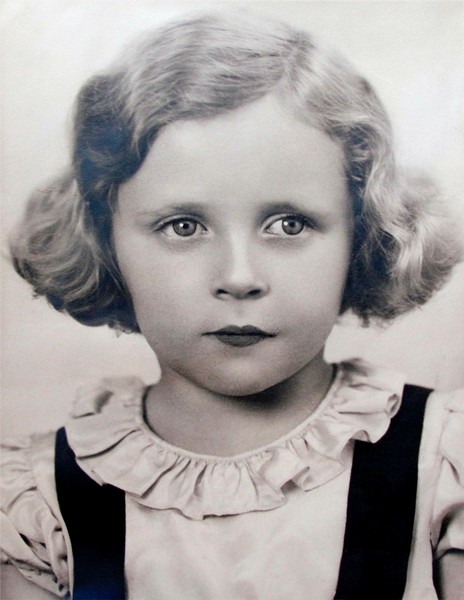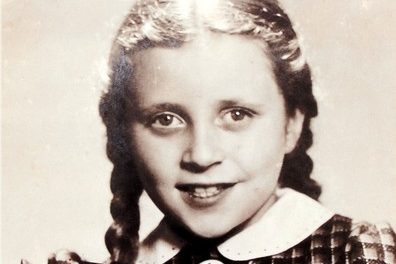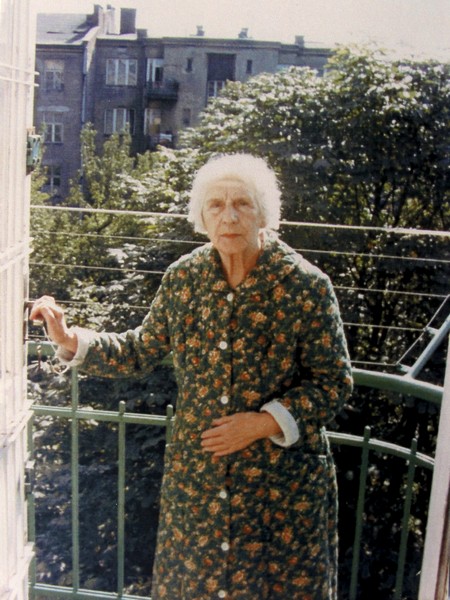Janina Ecker née Leiman

The "Save the Memory" project is a series of video interviews with witnesses of history from 1939- 1956. It was created to preserve the memories and experiences of the heroes and heroines from this period.
At the beginning of the film. the logos of the Polish History Museum are illustrated, featuring a yellow crown, gray wings, and the letter "P" in red with the Polish flag in the center. Also detailed is the phrase ”Patriotism of Tomorrow” with the letter "P" in black. Underneath these icons, there is a white inscription "Project co-financed by the Museum of Polish History in Warsaw as part of the Patriotism of Tomorrow program."
The main character of the film is Janina Ecker, maiden name Leimann, born in 1932 in Krakow. The
daughter of assimilated Jews, she was forced as a child to go into hiding on Aryan papers on her own.
After the war, she became an accountant for Israel's national airline. The woman is 84 years old and is
framed to her shoulders. She has blonde hair, pinned up in a ponytail. She is dressed in a white
sweater and a silver necklace made of beads. She is seated in a white leather chair, against a black
background with light stripes. Throughout the film, she shows footage from her private
archive, photos of her family, photos from Israel, and memorabilia.
At the end of the film appears a blackboard with the blue logo of the Historical Museum of the City of Krakow and the white logo of Oskar Schindler's Emalia Factory Lipowa 4. At the bottom is the website address www.ocalicpamiec.mhk.pl and the year of production - 2013.
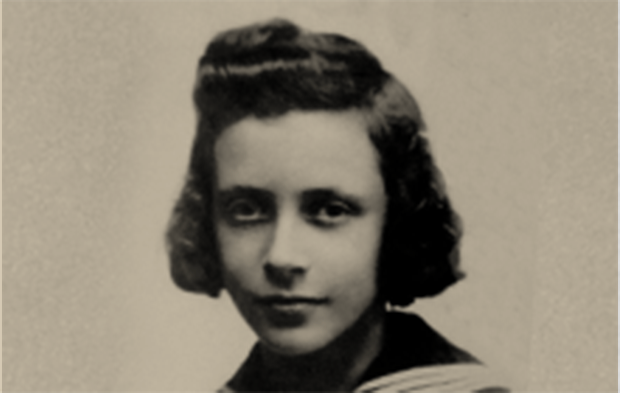
Janina Ecker née Leiman
1932 – 2025

Black and white photo for the ID card of teenage Janina. It is a portrait picture. The girl has dark hair just below the ear and low-set eyebrows. She is dressed in a uniform. On the right side of the photograph, part of a middle school stamp is visible.
Janina (Yanina, Halina, Nina) Ecker z d. Leiman (Leimann), (5 IX 1932, Kraków – 8 VI 2025, Givataim), córka Sary z d. Tempelhof i Dawida (Dolka). Jako dziecko zmuszona do samodzielnego ukrywania się na aryjskich papierach. Po wojnie księgowa w narodowych liniach lotniczych Izraela.
The Leiman family lived on Grzegórzecka Street in Kraków. David Leiman ran a jewelry shop on nearby Dietla Street and owned a tenement house on Słowacki Avenue which he rented out.
Although both were active members of the Zionist movement, they spoke Polish at home and David visited their local synagogue only during holidays. In 1934, while in Palestine, he bought a plot considering emigration.
A few days after WWII broke out, her father and oldest brother Ryszard, went to the east to join the Polish Army. Janina, her other brother Aleksander, and her mother Sara stayed in Kraków. The family business was soon taken over by the Germans and their flat was given to a Volksdeutsch prostitute with a child, leaving the Leiman family with just one room. Janina’s mother Sara was forced to work as a servant for the Volksdeutsch woman but eventually fled with the children and went to stay with her sister, Rosa Grun, on Paulińska Street. Sara started to sell family belongings to provide for living expenses.
In December 1939 the Nazis decided Jewish children shouldn’t be allowed to study and Janina was forced to quit the Hebrew Secondary School. She and her two cousins instead had private lessons.
In June 1940, Janina’s father wrote the family a letter from Lviv telling them that both he and Ryszard had been arrested.
Since Sarah did not have a job, at the end of 1940, the family was forced out of Kraków and moved to Gdów, about 30 miles south of the city. On 1 August 1942, the Nazis decreed that all Jews from towns in the Wieliczka district – Niepołomice, Dobczyce, Bieżanów, Gdów, and others – should move to Wieliczka.
The Leiman family was forced to share a room with four other families. Worried about the safety of her daughter, Sara asked her acquaintance from Gdów, Kazimiera Gomółka, to take Janina back to Kraków. Janina was supposed to find shelter at Mrs Maus’ apartment, but the woman, despite previous promises, refused.
Then, on 27 August 1942, The Leiman’s first tenants from their house on Słowackiego Avenue in Kraków arrived in Wieliczka to take some of the family’s memorabilia for safekeeping. They could not have expected that they would be asked to take care of 10-year-old Janina Leiman.
That day all the Jews were rounded up in the Market Square and forced to walk to Łąki Bogucickie close to Wieliczka railway station (today Wieliczka Park). After several hours of waiting, they were put on trains and taken off to forced labor or concentration camps.
It was in the chaos that Sara spotted the former tenants, Mr and Mrs Latawiec, and thrust Janina into their hands saying: “Save my child, she will be your joy.” The childless couple was extremely surprised but they took the girl to their one-room apartment on Zyblikiewicza Street (their former flat had been taken over by the Germans). To avoid suspicion the Latawiecs told their neighbors and the man they shared their flat with that Janina was their niece whose mother had died and whose father was in a POW camp.
The situation was difficult for both parties. Little Janina heard Latawiec’s talk at night about their frightful situation.
After a week, Sara Leiman wrote a letter from the camp she had been sent to in Płaszów (AL Plaszow) asking them to visit. The Latawiecs had decided to give the child back but during their meeting in the work camp, Sara managed to persuade them to keep Janina for another two weeks, telling Janina to be obedient because the couple could save her life.
Over time the Latawiecs began to love Janina. They called her Nina. Józefa Latawiec was a nurse, and Tadeusz worked at the post office. He was also a soldier of the Home Army (AK). He concluded that since he kept a gun at home, he might as well keep a Jewish child, too. For a year and a half, every Friday, he went to see Sara at the camp fence. One day he asked her for written consent to let them adopt Janina in case Sara and her husband died. She agreed.
Around Easter in 1943, the neighbors started to suspect that Janina was Jewish. The Latawiecs did everything possible to keep her away from home. For two months every morning, she visited Krakow’s churches with her Polish “mother”, and in the afternoon Rakowicki cemetery with her Polish “father”. But the neighbors, worried there that the Nazis would discover there was a Jewish girl in the building and refused to agree to Janina staying at home even at night. For six weeks Nina lived in a tool cell on the balcony of Tadeusz Latawiec’s German superior who was away on vacation and had left Tadeusz the keys so he could water his flowers.
To hide her true identity, Tadeusz Latawiec got hold of the birth certificate of a girl called Janina Baran who was suffering from polio. They cut Janina’s hair, made her wear glasses, and gave her crutches made of old brooms. Józefa Latawiec and Janina moved to Borek Falecki. But that didn’t stop a Polish policeman working for the Germans from finding out the truth and having to be birded after he put a gun to her head.
The Latawiecs did everything possible to save Janina’s life. The Central Welfare Council provided Józefa with a contact to a dormitory run by the Felician Sisters in the Convent of the Benedictines in Staniątki. On the way to the dormitory, Józefa baptized Janina in the o.o. Misjonarzy church on Stradomska Street. If it had not been for Janina’s request when already in the dormitory to have a “real” baptism, the Felician Sisters probably would not have discovered that she was Jewish. On 24 April 1944, Janina was baptized again and took her first communion. In Staniątki Janina helped the nuns take care of ill people from an old people’s nursing home as well as orphans brought to Staniątki from Warsaw after the Warsaw Uprising. In December 1944 the Felician Sisters got their property in Kraków back and Janina returned with them to Kraków.
On 19 January 1945, Tadeusz Latawiec settled all bills for Janina’s tuition and maintenance and took her back home on Slowackiego Avenue.
Six months later her real mother Sara Leiman returned, having survived three concentration camps in Plaszów, Skarżysko- Kamienna, and Hasag–Leipzig, as well as a death march.
Both Sara and Józefa wanted to be Janina’s mothers. Sara moved into Latawiec’s apartment and took a job in the kitchen of the Jewish Committee in Krakow. She allowed her daughter to be a devout Christian and attend a Catholic school on 16 Pędzichów Street.
In December 1946 Dawid and Ryszard returned after six years in Siberia and Uzbekistan. The Leimans lived in the same building one floor below the Latawiecs. Janina stayed with the Latawiecs since she did not want to go back to the Jews. Janina’s younger brother, Aleksander didn’t survive. He was arrested in Kielce and transported to the Auschwitz death camp where he was murdered on 22 February 1943.
In 1949 the Leimans emigrated to Israel, taking Nina with them. She later married Emanuel Ecker, a soldier from Lviv who served in the Polish II Corps under the command of General Władysław Anders. For many years she worked in the Israeli airline El Al. After retirement, she worked as a volunteer at the Diaspora Museum, a branch of the Yad Vashem Institute in Tel Aviv, and helped the elderly and wounded in Israel’s armed conflicts.
In 1979, 30 years after leaving she came back to Poland to visit her Polish “mother”. Her Polish “father”, Tadeusz, was already dead but she had not been able to come earlier due to the lack of diplomatic relations between PRL and Israel.
For several years now, Janina Ecker has accompanied Jewish groups to Poland telling them about the heroism of her Polish “parents”.
On 14 November 1985, her efforts to award the Latawiecs with the Righteous Among the Nations were successful. However, the communist regime did not let Józefa leave Poland and visit Israel. Janina planted the tree in the Avenue of the Righteous in Yad Vashem in Jerusalem herself on behalf of her Polish “parents”.
Janina Ecker was married twice. She has three daughters, six grandchildren, and a great-granddaughter.
Gallery
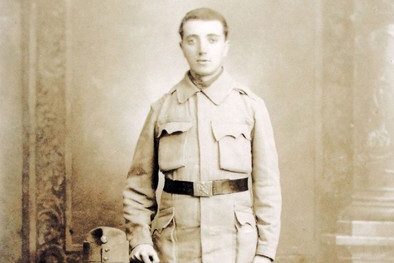
Dawid Leiman, Janina’s father. Kraków c. 1915.

Czarno-białe zdjęcie młodego ojca Janiny – Dawida Leimanna. Tłem jest zdjęcie ozdobnej ściany. Fotografia przedstawia całą sylwetkę Dawida. Mężczyzna ma krótkie, ciemne włosy, oraz owalną twarz. Ubrany jest w mundur z czarnym pasem, na nogach ma wysokie buty. Opiera się ręką o stolik, na którym leży rogatywka.
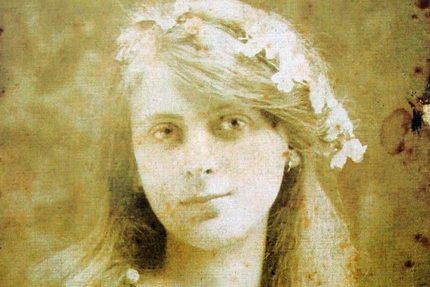
Sara Leiman, Janina’s mother. Kraków c. 1918.

A faded photo of Janina's teenage mother Sara Leiman. She is captured from the chest up. The woman has a gentle gaze and a slight smile. She has long, strawberry blonde hair, on which she has a garland of flowers. She is dressed in a white dress.
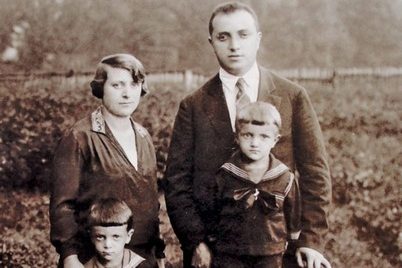
Janina’s parents with their sons: Roman and Olek. Kraków c. 1928.

Black and white photo of Janina's parents with their sons, Romek and Olek. The frame shows complete full shots of the family from head to toe. The photograph was taken in the garden. Shrubs and a fence and tall trees can be seen in the distance. The couple are middle-aged and elegantly dressed. Both have their hair cut short and are standing behind their sons. The boys are a few years old and are dressed in sailors uniforms. The older of the two is standing in front of his mother, who has her hand on his shoulder. The younger one stands on a chair on which his father is leaning on with his hands.
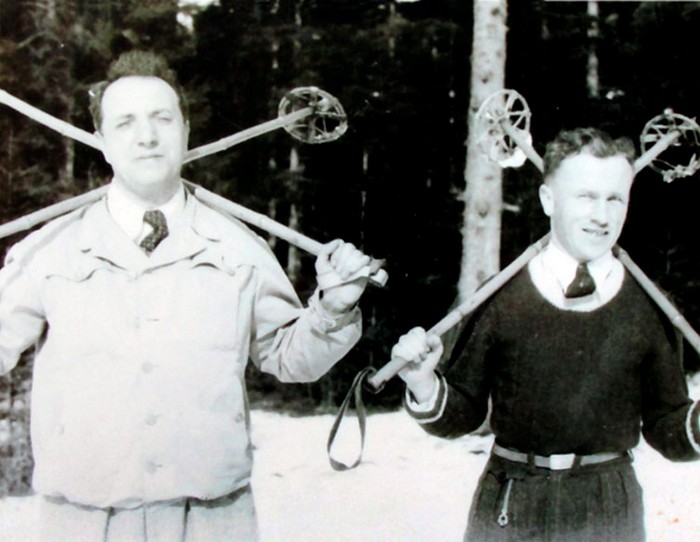
Dawid Leiman with his friend. C. 1938.

Black and white photo of Dawid Leiman with a friend, during a skiing trip. The background of the photograph is a snowy forest. The men are middle-aged, shot from the waist up. They have short dark hair and are squinting their eyes. They hold crossed ski poles behind their heads, resting them on their shoulders.
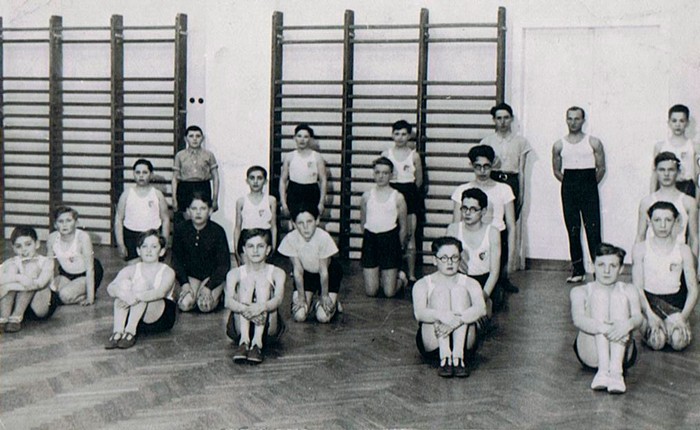
Olek Leiman (in the middle knelt) at Hebrew Gymnasium. Kraków in the 1930s.

Black and white photo of Janina's brother Olek Leiman with his class at the Hebrew Gymnasium. They are posing in the gymnasium against a background of ladders. The group of a dozen or so teenage students are dressed in sports kits - white T-shirts and dark shorts.
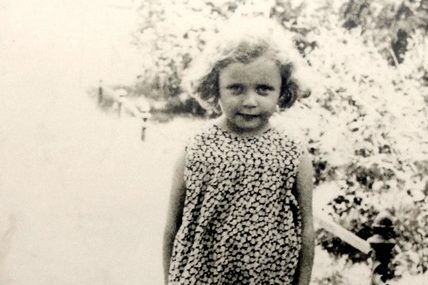
Janina (then Halina). Kraków 1935.

Black and white photo of three-year-old Janina Leiman. The background of the photograph is the Planty in Krakow - a path, metal railings and bushes are visible. The girl has a round face and light shoulder-length hair. She is dressed in a short summer floral dress and white shoes.
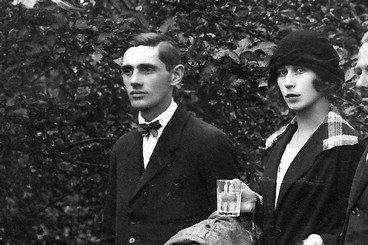
Józefa and Tadeusz Latawiec, Janina’s adopted Polish parents. Kraków c. 1925.

Czarno-białe zdjęcie młodych, polskich rodziców Janiny – Józefy i Tadeusza Latawców. Pozują na tle gęstego żywopłotu. Mężczyzna ma zaczesane na bok włosy, ubrany jest w czarny garnitur i muchę. W jednej ręce trzyma laskę, w drugiej kapelusz i płaszcz. Kobieta ma długą, kraciastą spódnicę i elegancką czarną marynarkę, z kraciastym kołnierzem. Na głowie ma ubrany kapeluszem, a w ręce trzyma ciemny parasol.
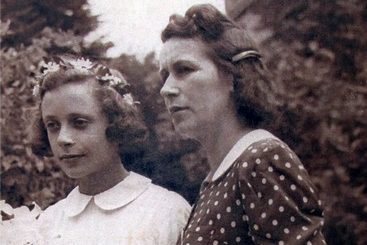
Janina (then Janina Baran) with her Polish mother. First communion. Staniątki 1944.

Black and white photo of Janina with herPolish mother during her First Holy Communion. They pose against a background of trees. The girl has short wavy hair and a garland of flowers on her head. She is dressed in a white simple dress with a collar. She holds white lilies in her right hand and a communion book in her left. The woman next to her is middle-aged holding her daughter around thw waist. Her shoulder-length hair is pinned up and she is dressed in a dark dress with white dots.
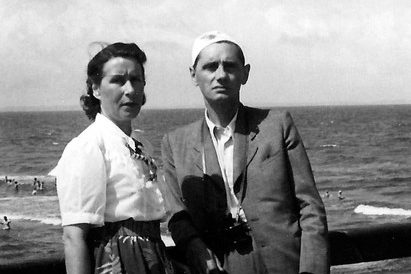
Józefa and Tadeusz Latawiec. Janina’s adopted Polish parents. Międzyzdroje 1949.

A black-and-white photo of Janina's Polish parents, Józefa and Tadeusz Latawiec. The couple are posing on a pier, with the sea visible behind them. The woman is dressed in a long flowy skirt with a floral pattern and a short-sleeved white blouse. The man is wearing a suit and a white cap on his head.
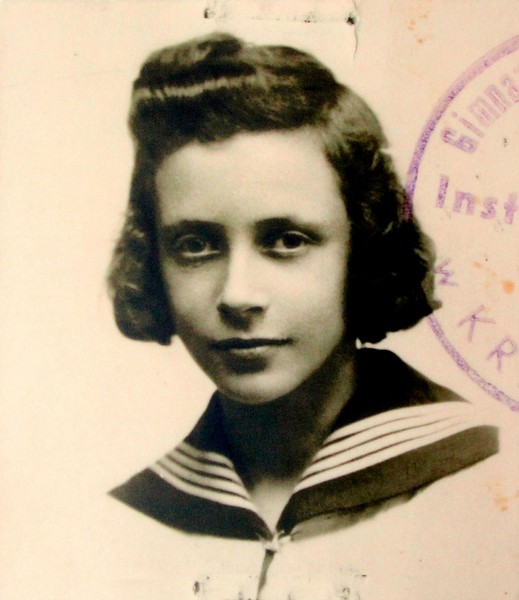
Janina when a student at Instytut Maryjny on 16 Pędzichów street. Kraków 1945.

Black and white photo for the ID card of teenage Janina. It is a portrait picture. The girl has dark hair just below the ear and low-set eyebrows. She is dressed in a uniform. On the right side of the photograph, part of a middle school stamp is visible.
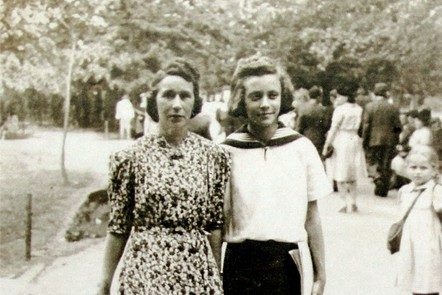
Janina with Józefa, her Polish mother. Kraków 1945.

Black and white photo of teenage Janina with her Polish mother, Józefa, on a walk in the park. The background of the photograph has trees and groups of passers-by. The women are walking side by side. The mother has her hair in a bun and she is wearing a patterned dress and dark shoes. Janina is dressed in a uniform - a white undershirt, a dark knee-length skirt, and white shoes.
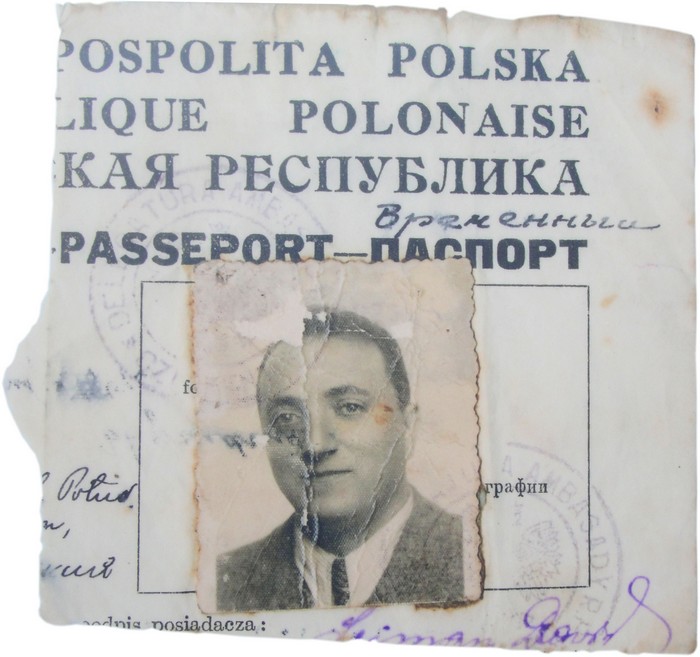
Dawid Leiman in 1949.

Fotografia przedstawia fragment paszportu Dawida Leimanna. Na białym papierze widoczny jest ucięty napis “Rzeczpospolita Polska” w czterech różnych językach – po polsku, francusku, rosyjsku i angielsku. Pod nimi znajduje się wyblakłe, podniszczone portretowe zdjęcie mężczyzny w średnim wieku, patrzącego w obiektyw. Ma on krótkie włosy i ubrany jest w białą koszulę i kamizelkę.
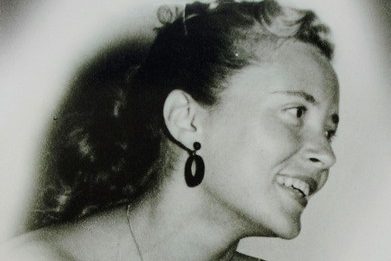
Yanina Ecker. Tel Aviv in the 1950s.Yanina Ecker. Tel Aviv in the 1950s.

A black and white photograph of twenty-year-old Janina Ecker. She poses to the right profile and the frame covers up to her chest. The smiling woman has straight eyebrows, a slightly upturned nose, and tied long wavy hair. She has large round dark earrings in her ears and a medallion with a white sculpture around her neck. She is dressed in a tight shoulderless top.
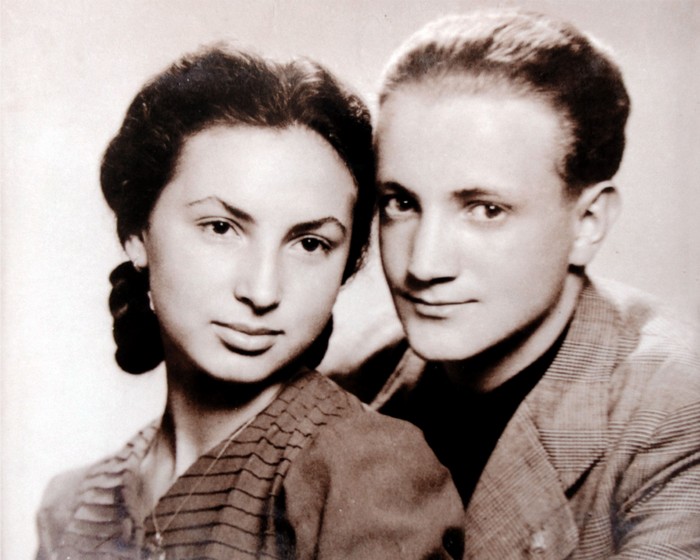
Ryszard Leiman, Janina’s brother. Tel Aviv in the 1950s.

Czarno-białe, portretowe zdjęcie dwudziestoparoletniego brata Janiny – Ryszarda Leimana z kobietą. Ma ona ciemne spięte włosy. Ubrana jest w szarą sukienkę, na szyi ma złoty łańcuszek. Ryszard ma wąskie usta, orli nos i wydatne czoło oraz krótkie włosy zaczesane do tyłu. Lekko się uśmiecha. Ubrany jest w czarną koszulkę i szarą marynarkę.
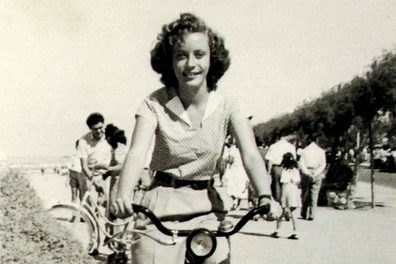
Yanina Ecker. Tel Aviv in the 1950s.Yanina Ecker. Tel Aviv in the 1950s.

Black and white photo of young Janina in Tel Aviv. She is riding a bicycle facing the lens. Behind her are passers by with bicycles, and in the distance a beach. The girl has curly, medium-length hair. She is dressed in a short-sleeved blouse and suit pants. She is riding her bicycle facing the lens.
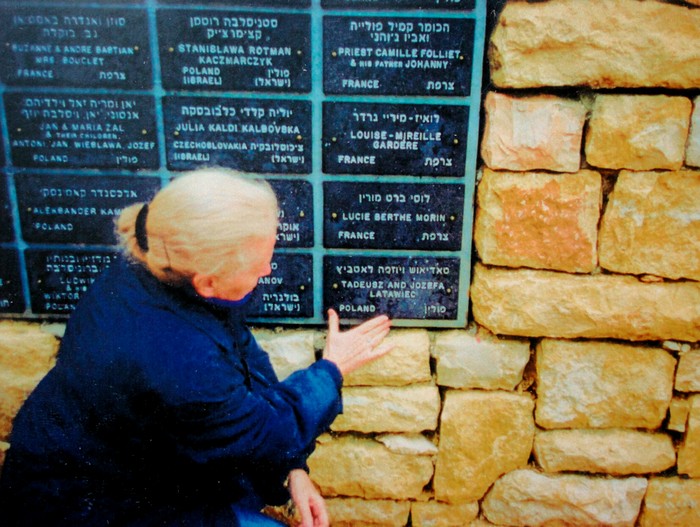
Yanina Ecker in the Righteous Among Nations Avenue in Yad Vashem pointing to the names of her Polish parents.

Colour photo of seventy-year-old Janina in Tel Aviv. The woman has her back to the lens. She crouches by a stonewall and points to the Polish names of her ancestors on a black commemorative plaque on the wall. Janina has gray hair in a bun and a navy blue jacket.
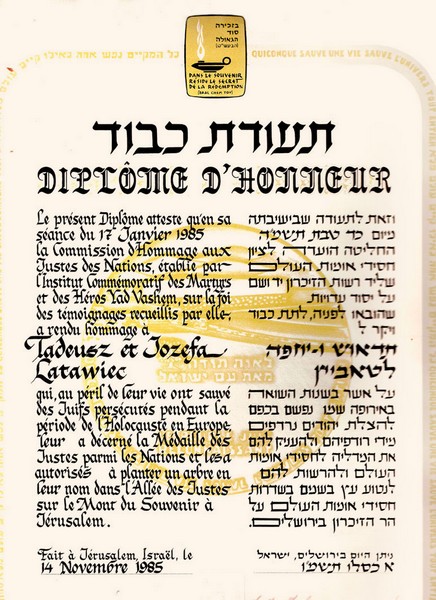
Righteous Among Nations Certificate for Józefa and Tadeusz Latawiec.

Diploma of the Righteous Among the Nations for Józefa and Tadeusz Latawiec. The document is white with black decorative print. Its contents are written in French and Hebrew, with a gold logo behind the text. At the bottom is the date 14.11.1985.
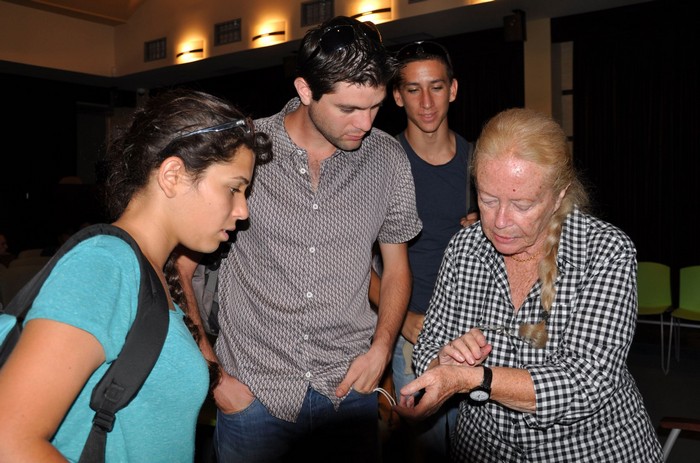
Yanina Ecker during her lecture at Schindler’s Factory. Kraków, 2012.

Color photo of Janina Ecker during a lecture for Israeli youth at Krakow's Schindler Factory. Everyone is in the conference room. The woman is standing in the company of two young boys and one woman. They are talking to each other. Janina has long blond hair braided. She is dressed in a black and white checkered shirt and a black watch on her left wrist.
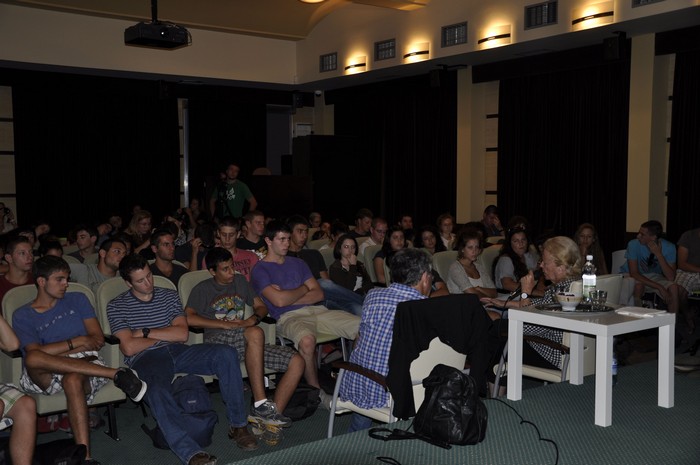
Yanina Ecker during her lecture at Schindler’s Factory. Kraków, 2012.

Kolorowe zdjęcie sali pełnej izraelskiej młodzieży podczas wykładu Janiny Ecker w Fabryce Schindlera. Znajdują się w sali konferencyjnej. Grupa młodych słuchaczy ubrana jest w letnie ubrania. Ze skupieniem słuchają Janiny, która siedzi przed nimi na krześle i trzyma mikrofon.

